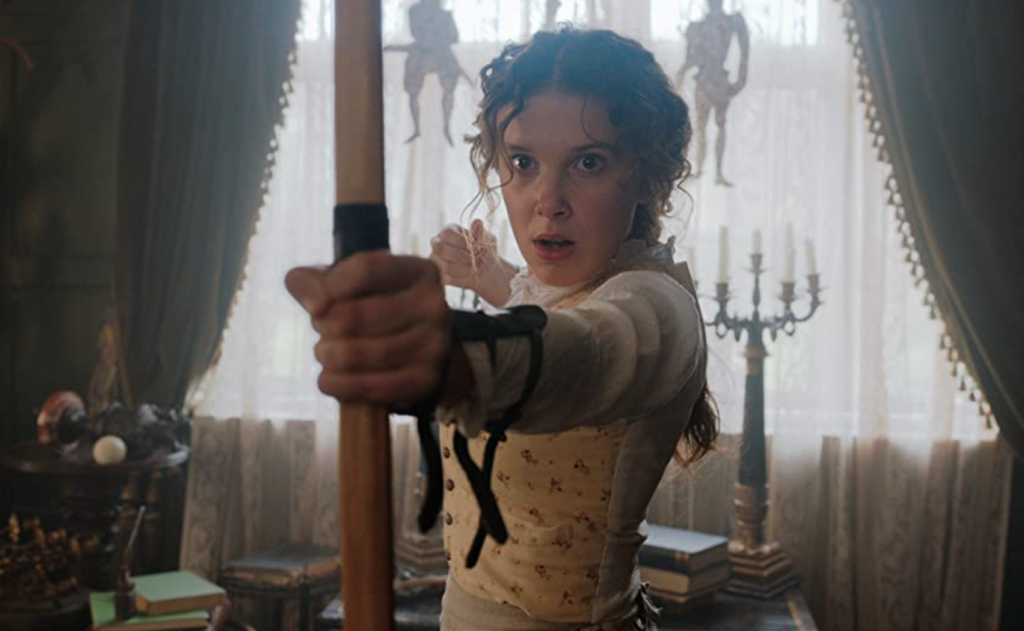You’ve heard of Sherlock Holmes, but what do you know of his sister?
“Enola Holmes,” released Sept. 23 on Netflix, presents that untold story.
Based on the novel series by Nancy Springer, the 123-minute adventure film from director Harry Bradbeer dives into the world of the famed fictional detective’s spunky teen sister as she seeks to solve the mystery of her mother’s disappearance.
When we meet Enola (Millie Bobby Brown) in the opening scene, peddling down a country lane, hair blowing wildly in the wind, her demeanor immediately conveys that she refuses to conform to the feminine norms of her time. Raised almost exclusively by her progressive mother (Helena Bonham Carter), she professes, “I was never taught to embroider, I never molded wax roses, hemmed handkerchiefs, or strung seashells. I was taught to watch and listen. I was taught to fight. This is what my mother made me for!”
Unorthodox as she might be, Enola’s personality offers a valuable lesson on the meaning of female empowerment, both for women of her own time as well as today.
From start to finish, the film retains the flavor of Sir Arthur Conan Doyle’s beloved Holmes mysteries, while adding a new twist of feminine genius. Henry Cavill’s performance as Sherlock captures his quintessential quick wit, even while he watches his sister race ahead to crack the case.
At times, Enola’s development as a detective in her own right brushes up against a feminist mentality rife with bitterness and aggression. Under her mother’s tutelage, she receives an education that on the one hand encourages confidence and intellectual development, but on the other hand scoffs at men as a hindrance, welcomes the use of violent force to assert oneself, and preaches that “privacy [is] the highest virtue” (a sentiment eerily reminiscent of the “right to privacy” that sanctioned abortion in Roe v. Wade).
Nevertheless, Enola does not blindly absorb these doctrines; she has a choice on how to respond. And her response is what propels “Enola Holmes” to cinematic success.
Enola becomes the heroine she is because she balances her nonconformist character with a selfless concern for others. When she finds her quest to find her mother disrupted by her encounter with the young Viscount Tewksbury (Louis Partridge), who finds himself in grave danger, she must decide whether to heed or resist her mother’s advice to not be “thrown off course by other people — especially men!” But her decision to help Tewksbery damages neither her character nor her adventure. Rather, it enriches them.
Later on, Enola recalls her mother insisting that she avoid risking her life to save the vulnerable and instead “let nature take its course.” But once again, her heart propels her to offer help where it is needed, knowing that she has strength to defend those who cannot defend themselves.
Finally, although she initially rejects the need for friends and resists Tewksbery’s growing admiration for her, Enola faces the reality that bonding with others infuses her sleuthing skills with purpose. When she opens herself up to personal relationships, she finds something worth fighting for. This development makes her character more intriguing and her adventure more enjoyable to watch.
Besides an exciting mystery movie, “Enola Holmes” sends the message that being a strong woman does not mean that a woman must only look out for herself. On the contrary, caring for and defending others marks her with even greater strength because it empowers her with virtue.
Showcasing that kind of strength makes Enola an even more powerful and positive agent of change than her mother’s education trained her to be — and it makes her an emblem of the best kind of female leadership.
“Enola Holmes” is available for streaming on Netflix.

